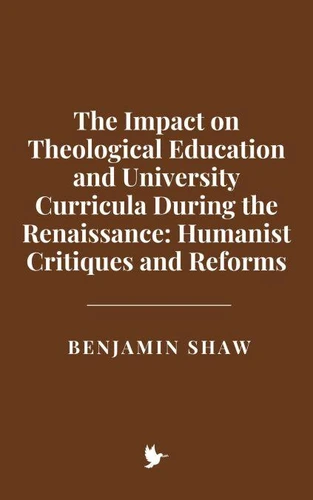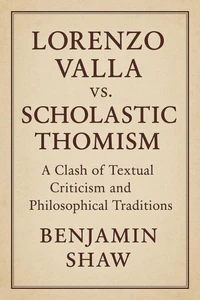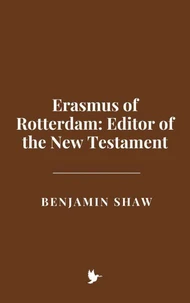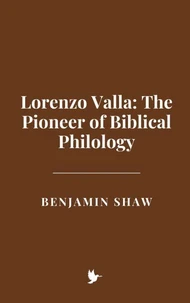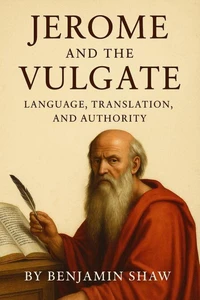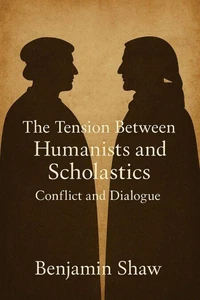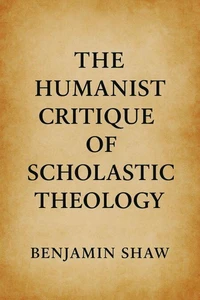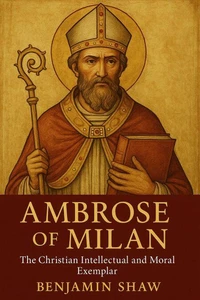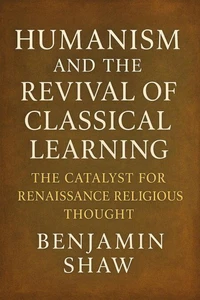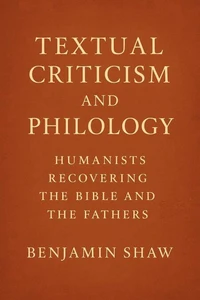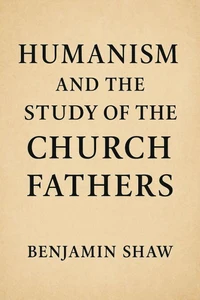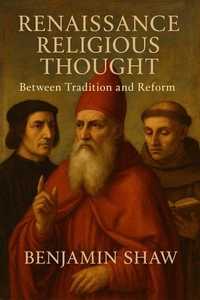The Impact on Theological Education and University Curricula During the Renaissance: Humanist Critiques and Reforms
Par :Formats :
Disponible dans votre compte client Decitre ou Furet du Nord dès validation de votre commande. Le format ePub est :
- Compatible avec une lecture sur My Vivlio (smartphone, tablette, ordinateur)
- Compatible avec une lecture sur liseuses Vivlio
- Pour les liseuses autres que Vivlio, vous devez utiliser le logiciel Adobe Digital Edition. Non compatible avec la lecture sur les liseuses Kindle, Remarkable et Sony
 , qui est-ce ?
, qui est-ce ?Notre partenaire de plateforme de lecture numérique où vous retrouverez l'ensemble de vos ebooks gratuitement
Pour en savoir plus sur nos ebooks, consultez notre aide en ligne ici
- FormatePub
- ISBN8231734450
- EAN9798231734450
- Date de parution06/08/2025
- Protection num.pas de protection
- Infos supplémentairesepub
- ÉditeurWalzone Press
Résumé
This illuminating study explores how Renaissance humanism profoundly transformed theological education and university curricula across Europe. Benjamin Shaw traces the sweeping intellectual shifts sparked by humanist scholars who challenged medieval scholasticism's dominance-questioning its reliance on abstract disputations, outdated commentaries, and limited engagement with original biblical and patristic sources.
By championing a return ad fontes ("to the sources"), humanists revitalized the study of Scripture and the Church Fathers in their original languages, pioneering new methods of textual criticism, historical contextualization, and rhetorical education. Through detailed case studies of major universities-including Paris, Louvain, Padua, Heidelberg, and Wittenberg-this book reveals how humanist critiques sparked curricular reforms, pedagogical innovations, and vibrant debates between traditional scholastic theologians and reform-minded humanists.
Shaw examines the pivotal role of figures such as Lorenzo Valla and Erasmus of Rotterdam in reshaping theological texts and teaching, alongside the Catholic Counter-Reformation's strategic responses embodied in Jesuit education. Blending rich historical analysis with theological insight, this work offers an indispensable resource for understanding the Renaissance's enduring legacy in modern theological education.
It uncovers how humanist scholarship laid the foundation for critical biblical studies, doctrinal renewal, and the dynamic interplay between tradition and innovation that continues to shape theological inquiry today.
By championing a return ad fontes ("to the sources"), humanists revitalized the study of Scripture and the Church Fathers in their original languages, pioneering new methods of textual criticism, historical contextualization, and rhetorical education. Through detailed case studies of major universities-including Paris, Louvain, Padua, Heidelberg, and Wittenberg-this book reveals how humanist critiques sparked curricular reforms, pedagogical innovations, and vibrant debates between traditional scholastic theologians and reform-minded humanists.
Shaw examines the pivotal role of figures such as Lorenzo Valla and Erasmus of Rotterdam in reshaping theological texts and teaching, alongside the Catholic Counter-Reformation's strategic responses embodied in Jesuit education. Blending rich historical analysis with theological insight, this work offers an indispensable resource for understanding the Renaissance's enduring legacy in modern theological education.
It uncovers how humanist scholarship laid the foundation for critical biblical studies, doctrinal renewal, and the dynamic interplay between tradition and innovation that continues to shape theological inquiry today.
This illuminating study explores how Renaissance humanism profoundly transformed theological education and university curricula across Europe. Benjamin Shaw traces the sweeping intellectual shifts sparked by humanist scholars who challenged medieval scholasticism's dominance-questioning its reliance on abstract disputations, outdated commentaries, and limited engagement with original biblical and patristic sources.
By championing a return ad fontes ("to the sources"), humanists revitalized the study of Scripture and the Church Fathers in their original languages, pioneering new methods of textual criticism, historical contextualization, and rhetorical education. Through detailed case studies of major universities-including Paris, Louvain, Padua, Heidelberg, and Wittenberg-this book reveals how humanist critiques sparked curricular reforms, pedagogical innovations, and vibrant debates between traditional scholastic theologians and reform-minded humanists.
Shaw examines the pivotal role of figures such as Lorenzo Valla and Erasmus of Rotterdam in reshaping theological texts and teaching, alongside the Catholic Counter-Reformation's strategic responses embodied in Jesuit education. Blending rich historical analysis with theological insight, this work offers an indispensable resource for understanding the Renaissance's enduring legacy in modern theological education.
It uncovers how humanist scholarship laid the foundation for critical biblical studies, doctrinal renewal, and the dynamic interplay between tradition and innovation that continues to shape theological inquiry today.
By championing a return ad fontes ("to the sources"), humanists revitalized the study of Scripture and the Church Fathers in their original languages, pioneering new methods of textual criticism, historical contextualization, and rhetorical education. Through detailed case studies of major universities-including Paris, Louvain, Padua, Heidelberg, and Wittenberg-this book reveals how humanist critiques sparked curricular reforms, pedagogical innovations, and vibrant debates between traditional scholastic theologians and reform-minded humanists.
Shaw examines the pivotal role of figures such as Lorenzo Valla and Erasmus of Rotterdam in reshaping theological texts and teaching, alongside the Catholic Counter-Reformation's strategic responses embodied in Jesuit education. Blending rich historical analysis with theological insight, this work offers an indispensable resource for understanding the Renaissance's enduring legacy in modern theological education.
It uncovers how humanist scholarship laid the foundation for critical biblical studies, doctrinal renewal, and the dynamic interplay between tradition and innovation that continues to shape theological inquiry today.

